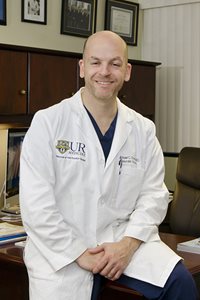A Message from the Chief

In the midst of a worldwide health crisis, the Vascular Surgery Division has continued its critical mission of caring for patients with vascular disease, adapting to the challenges with resiliency and creativity. During the early stages of the pandemic, our faculty and residents were reorganized into platooned groups to limit potential viral spread to patients and clinical team members. The unintended result of a small, acute care focused group was a more effective and efficient acute care vascular surgical team.
Vaccination and decreased community viral penetrance allowed for structured resumption of ambulatory surgical procedures, and we maintained the acute care model, splitting the primary teaching service into two. This has helped ensure more focused care and improved logistics for inpatient consults, as well as cases originating in the Emergency Department. Our consult service has increased resident autonomy and patient responsiveness while allowing us to cope with the ramifications of deferred care and more advanced disease state presentations in an already high-risk patient population.
Despite the operational stress associated with the pandemic, our Division remains academically productive and true to its mission to train future leaders in vascular surgery. The Cardiovascular Engineering Laboratory has been incredibly productive and is actively developing hemodynamic models of acute aortic dissection and novel magnetic resonance aortic elastography techniques. Our outcomes research has focused on the relationship of surgeon volume on patient outcomes and societal healthcare value. These data are being used to derive metrics for surgeon safety and competency. The residents and faculty remain actively involved as leaders in regional and national surgical societies. Clinical research around minimal-access carotid surgery (TCAR) has focused on technical improvements, as we continue to lead the region with this novel technique.
UR Medicine Vascular Surgery continues to be recognized as a quality leader, earning a three-star (the highest) rating from the Vascular Quality Initiative. Our program remains at the forefront in the medical management of vascular patients, long-term follow-up strategy and tracking the outcomes of endovascular aortic repair in the region. Through our quality program, Rochester is one of 15 sites piloting patient-reported outcomes in peripheral vascular disease, which will form the basis for value-based care delivery and reimbursement. Our vein center remains the only formally accredited academic vein center in Upstate New York.
With the addition of two new faculty, Dr. Karina Newhall and Dr. Grayson Pitcher, our group extends its clinical, academic and educational capabilities. We are pleased to add faculty from nationally renowned institutions, which will expand the depth and breadth of our services at the main campus, as well as allow our group to bring the same high-quality care into the region.
We are honored that Kenneth Ouriel ’77, ’86M (Res), ’87M (Flw) and his wife, Joy Bracker Ouriel, have committed $1.5 million to establish the Kenneth and Joy Ouriel Family Professorship within the University of Rochester Medical Center’s Division of Vascular Surgery. The family’s endowed gift will advance excellence within the vascular surgery program and provide resources to honor, recruit, and retain world-class faculty and staff leaders who can identify, understand, and treat some of the most complex health problems challenging society today.
As the Division Chief, I am humbled by the dedication, hard work and resilience of our team. Every member of our group comes to work every day, emboldened by prior successes, to care for patients and meet new challenges. The team has never been stronger and continues to support each other as we adapt and overcome.
Michael C. Stoner, M.D., F.A.C.S.
Professor of Surgery; Chief, Division of Vascular Surgery; Vice Chair for Clinical Operations